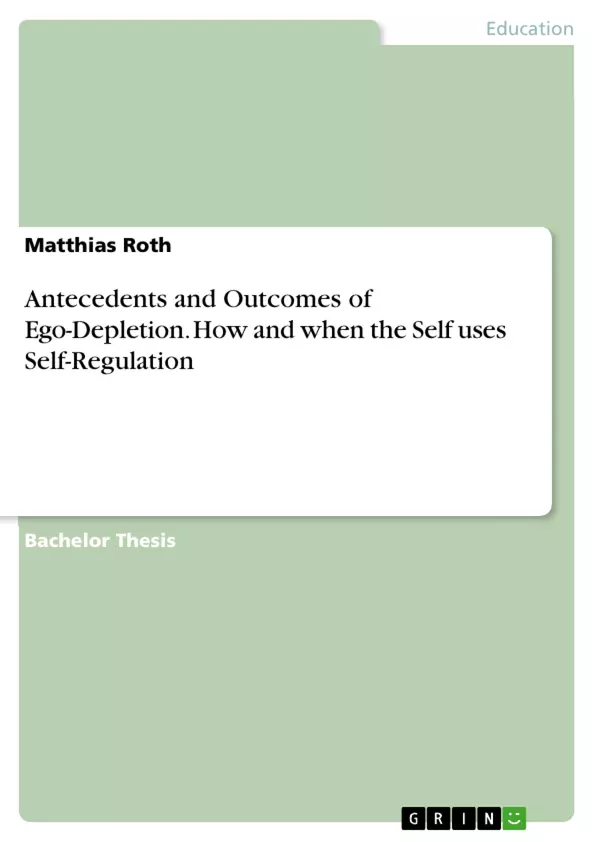This thesis tries to achieve a better understanding of how and when the self uses self-regulation and why it breaks down some times. Self-regulatory success is related to enabling people to delay gratification and thus to reach long-term goals. In contrast, self-regulatory failure is associated with smoking, crime, divorces, depression, obsessive thoughts and school underachievement. Responsible for such acts of volition? The Self.
Over the past two decades, a growing body of social psychology research has examined how all these favourable or maladaptive outcomes are related. Baumeister et al. (1998) concentrated on the “controlling aspect of the self” and suggested that all acts of volition draw on a limited resource. Making use of this resource for self-regulatory responses means to deplete it, which indicates to have less of it for the following task involving self-regulation. Muraven, Tice, and Baumeister (1998) proposed a strength model to explain the hypothesis of regulatory depletion.
A large number of studies can be traced back to these antecedents and brought supporting evidence. However, in recent years, this paradigm has been questioned. This thesis provides an overview of how the research has progressed, from the roots to the present day. In the next section, the most important terms are defined and related. In a literature review, evidence for and against the underlying theories by visiting many empirical findings from different spheres is presented and linked to the theory. The thesis is completed by implications for marketers how to make use of the findings to boost sales. At the end, several limitations and possibilities for future research are exhibited.
Inhaltsverzeichnis (Table of Contents)
- 1. Introduction
- 2. Theoretical Foundations
- 3. Antecedents and Outcomes of Ego Depletion
- 3.1 Evidence of the effect
- 3.1.1 The state of ego depletion
- 3.1.2 Ego depletion by making choices
- 3.1.3 Effects of ego depletion
- 3.1.4 Overcoming the effect
- 3.2 Concerns about the theory
- 3.1 Evidence of the effect
- 4. Discussion
- 4.1 Managerial Implications
- 4.2 Limitations and Future Research
Zielsetzung und Themenschwerpunkte (Objectives and Key Themes)
This thesis aims to provide a comprehensive literature review on the antecedents and outcomes of ego depletion. It investigates the theoretical foundations and explores the evidence supporting and challenging the ego depletion paradigm. The review will examine the strength model as the dominant explanation for the effect, exploring its implications for self-regulatory success and failure.
- The concept of ego depletion and its theoretical underpinnings
- Empirical evidence supporting the existence of ego depletion
- Factors that influence the onset and mitigation of ego depletion
- Potential limitations and controversies surrounding the ego depletion theory
- Practical implications and future directions for research on ego depletion
Zusammenfassung der Kapitel (Chapter Summaries)
- Chapter 1: Introduction This chapter introduces the concept of self-regulation and its importance in achieving long-term goals. It highlights the link between self-regulatory success and failure and the role of the self in these processes. The chapter introduces the ego depletion paradigm, suggesting that acts of volition draw on a limited resource that can be depleted. This depletion is linked to decreased capacity for subsequent self-regulation, leading to self-regulatory failure.
- Chapter 2: Theoretical Foundations This chapter delves into the theoretical foundations of ego depletion, focusing on the strength model. It explains how the model conceptualizes self-regulation as a limited resource that can be depleted by acts of self-control. This depletion, in turn, leads to decreased ability for subsequent self-regulatory tasks, explaining the phenomenon of ego depletion.
- Chapter 3: Antecedents and Outcomes of Ego Depletion This chapter examines the empirical evidence supporting the existence of ego depletion. It explores various studies that demonstrate how ego depletion affects behavior, such as increased impulsivity and decreased self-control. The chapter also discusses potential ways to overcome or mitigate the effects of ego depletion.
- Chapter 4: Discussion This chapter explores the managerial implications of the ego depletion paradigm, suggesting strategies for managing and mitigating ego depletion in various contexts. It also discusses potential limitations of the theory and areas for future research.
Schlüsselwörter (Keywords)
The key terms and concepts explored in this thesis include ego depletion, self-regulation, strength model, limited resource, self-control, willpower, decision fatigue, impulsivity, delayed gratification, and goal achievement. The thesis investigates the theoretical underpinnings and empirical evidence surrounding these concepts, exploring their significance in understanding human behavior and self-regulatory processes.
What is ego depletion?
Ego depletion is the theory that self-control or willpower draws upon a limited pool of mental resources that can be used up, leading to reduced self-regulation in subsequent tasks.
What is the "strength model" of self-regulation?
Proposed by Baumeister et al., it compares willpower to a muscle that becomes fatigued after use but can be strengthened over time through practice.
What are the outcomes of self-regulatory failure?
Failure in self-regulation is linked to impulsive behaviors such as smoking, overeating, crime, depression, and poor school performance.
How can marketers use the findings of ego depletion?
Marketers can boost sales by identifying when consumers are in a state of decision fatigue or resource depletion, making them more susceptible to impulsive purchases.
Is the ego depletion theory controversial?
Yes, recent research has questioned the paradigm, and the thesis discusses both empirical evidence for and modern concerns against the theory.



